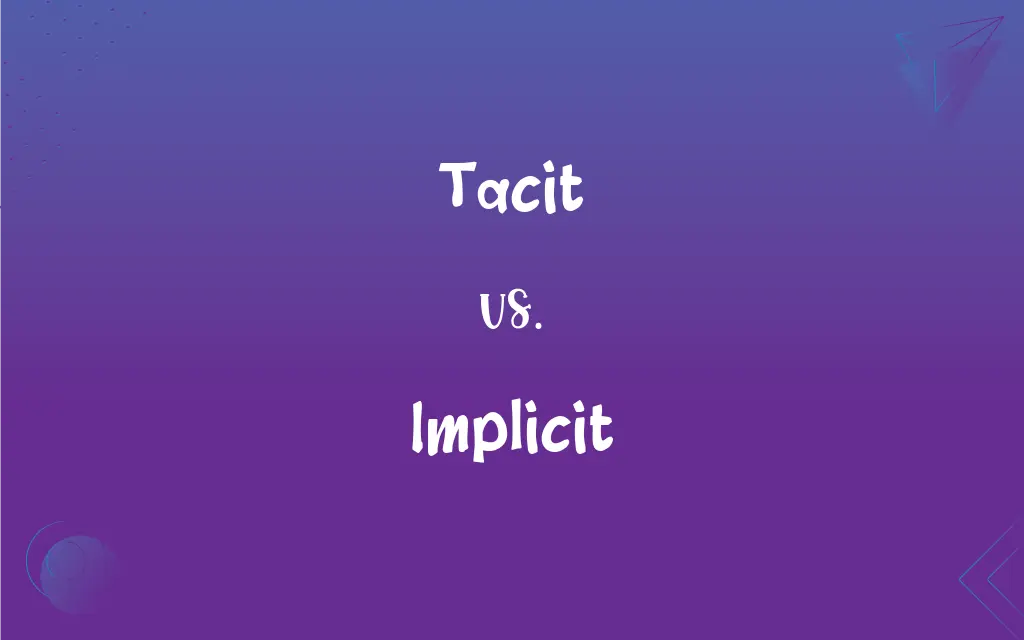Tacit vs. Implicit: What's the Difference?
By Aimie Carlson || Updated on May 20, 2024
Tacit refers to something understood without being openly expressed, while implicit means something implied or suggested but not directly stated.

Key Differences
Tacit knowledge or agreement is understood or implied without being stated openly. It involves unspoken understandings that everyone assumes without needing explicit communication. Implicit knowledge or meaning is suggested or inferred but not directly expressed. It relies on context or cues to convey the message.
Tacit consent is often given through non-verbal actions or lack of opposition, making it a subtle form of agreement. Implicit consent, on the other hand, is granted through actions or statements that indirectly indicate approval, such as continuing to participate in an activity.
In legal contexts, tacit agreements may be harder to prove since they rely on mutual understanding without documentation. Implicit agreements might be easier to infer from behavior and circumstances, though they still lack explicit confirmation.
Tacit learning occurs through observation and practice without formal instruction, whereas implicit learning happens through exposure to patterns and regularities in the environment without conscious effort.
Tacit knowledge is typically personal and context-specific, making it difficult to transfer to others. Implicit knowledge, while also often unstated, can be more universally understood through shared context or culture.
ADVERTISEMENT
Comparison Chart
Definition
Understood without being stated
Implied or suggested, not stated
Communication
Non-verbal, unspoken understanding
Contextual clues, inferred
Example
Tacit agreement not to discuss pay
Implicit approval through nodding
Legal Context
Harder to prove, no documentation
Inferred from behavior and context
Learning
Through observation and practice
Through exposure to patterns
ADVERTISEMENT
Tacit and Implicit Definitions
Tacit
Unspoken but assumed.
They had a tacit rule against calling after 10 PM.
Implicit
Mplied though not directly stated.
His comments carried an implicit criticism of the management.
Tacit
Implied by actions or silence.
Her nod was taken as tacit approval of the plan.
Implicit
Inherent without being overt.
There was an implicit risk in the investment.
Tacit
Known but not declared openly.
There was a tacit understanding among the team members.
Implicit
Understood without explicit expression.
The implicit assumption was that everyone would participate.
Tacit
Understood without being openly stated.
There was a tacit agreement to avoid discussing politics at dinner.
Implicit
Contained within the nature of something.
The implicit trust in their relationship was evident.
Tacit
Silent but understood.
His silence was a tacit acknowledgment of the problem.
Implicit
Implied or understood though not directly expressed
An implicit agreement not to raise the touchy subject.
Tacit
Not spoken
Indicated tacit approval by smiling and winking.
Implicit
Contained in the nature of something though not readily apparent
"Frustration is implicit in any attempt to express the deepest self" (Patricia Hampl).
Tacit
Implied by or inferred from actions or statements
Management has given its tacit approval to the plan.
Implicit
Having no doubts or reservations; unquestioning
Implicit trust.
Tacit
(Archaic) Not speaking; silent.
Implicit
Implied indirectly, without being directly expressed
Tacit
Implied, but not made explicit, especially through silence.
Tacit consent'' : consent by silence, or by not raising an objection
Implicit
Contained in the essential nature of something but not openly shown
Tacit
(logic) Not derived from formal principles of reasoning; based on induction rather than deduction.
Implicit
Having no reservations or doubts; unquestioning or unconditional; usually said of faith or trust.
Tacit
Done or made in silence; implied, but not expressed; silent; as, tacit consent is consent by silence, or by not interposing an objection.
The tacit and secret theft of abusing our brother in civil contracts.
Implicit
(obsolete) entangled, twisted together.
Tacit
Indicated by necessary connotation though not expressed directly;
Gave silent consent
A tacit agreement
The understood provisos of a custody agreement
Implicit
Infolded; entangled; complicated; involved.
In his woolly fleeceI cling implicit.
Implicit
Tacitly comprised; fairly to be understood, though not expressed in words; implied; as, an implicit contract or agreement.
Implicit
Resting on another; trusting in the word or authority of another, without doubt or reserve; unquestioning; complete; as, implicit confidence; implicit obedience.
Back again to implicit faith I fall.
Implicit
Implied though not directly expressed; inherent in the nature of something;
An implicit agreement not to raise the subject
There was implicit criticism in his voice
Anger was implicit in the argument
The oak is implicit in the acorn
Implicit
Being without doubt or reserve;
Implicit trust
Implicit
Suggested but not expressed.
The implicit message in her speech was clear.
FAQs
How do tacit and implicit differ?
Tacit is more about unspoken understandings, while implicit refers to something suggested by context.
Can tacit be used in legal contexts?
Yes, but proving tacit agreements can be challenging as they lack explicit documentation.
What does implicit mean?
Implicit means something suggested or inferred but not directly expressed.
How are tacit and implicit similar?
Both involve understandings or meanings that are not explicitly stated.
Is tacit consent legally binding?
It can be, but it is often harder to prove than explicit consent.
What is an example of tacit approval?
An example of tacit approval is nodding in agreement without saying anything.
What does tacit mean?
Tacit means something understood or implied without being openly stated.
Is tacit knowledge always unspoken?
Yes, tacit knowledge is typically unspoken and understood through experience.
Can tacit understandings be formalized?
Yes, tacit understandings can sometimes be formalized into explicit agreements.
How is tacit knowledge acquired?
Tacit knowledge is acquired through experience and observation without formal teaching.
How is implicit knowledge acquired?
Implicit knowledge is acquired through exposure to patterns and regularities in the environment.
Can something be both tacit and implicit?
Yes, something can be understood both tacitly and implicitly based on context and actions.
What is an example of implicit criticism?
An example of implicit criticism is suggesting improvements without directly stating faults.
Is implicit consent the same as explicit consent?
No, implicit consent is inferred from actions or circumstances, while explicit consent is clearly stated.
What is a tacit agreement?
A tacit agreement is an unspoken understanding between parties.
Can implicit knowledge be shared easily?
Implicit knowledge can be shared through context and cultural cues, though it is not directly stated.
Is implicit communication always non-verbal?
Not always, implicit communication can be verbal but relies on context to convey the full meaning.
What role does context play in implicit meaning?
Context is crucial in implicit meaning as it helps infer the unstated message.
What is an implicit agreement?
An implicit agreement is inferred from actions or circumstances rather than direct statements.
How do cultural differences affect implicit understanding?
Cultural differences can greatly affect implicit understanding as different cultures may interpret actions and contexts differently.
About Author
Written by
Aimie CarlsonAimie Carlson, holding a master's degree in English literature, is a fervent English language enthusiast. She lends her writing talents to Difference Wiki, a prominent website that specializes in comparisons, offering readers insightful analyses that both captivate and inform.
































































